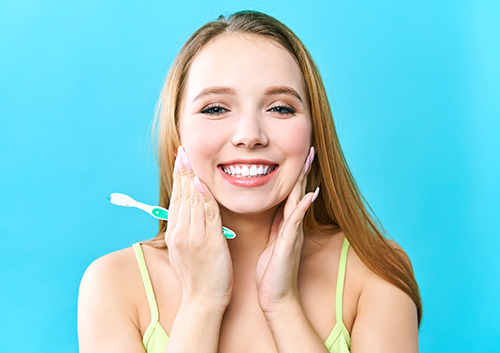Five (Easy-to-Keep!) Dental Resolutions for the New Year
January 1st, 2025

It’s a new year! A blank calendar! A traditional time to make a few changes that could change your life for the better. And while we applaud big goals like learning a new language or finally getting those closets reorganized, we’d like to start small with a few simple, proactive dental resolutions suitable for anyone’s list.
- Floss Every Day
Yes, we know we talk a lot about flossing. That’s because flossing can be a game-changer when it comes to healthy teeth and gums.
Proper flossing removes the plaque from spots your brush often misses—between the teeth and near the gum line. When you floss, you accomplish two goals: you help prevent cavities and you help prevent gum disease. And once each day is all it takes—as long as you take your time and floss properly.
If you’re having trouble flossing properly (a very common problem!), don’t hesitate to talk with Dr. Chad Vanourny to discover the best techniques and products to make your personal flossing experience as relaxed and effective as possible.
- Retire Your Brush
Brushes work hard—that’s why they should be replaced after a few months of use. Bristles start to fray over weeks of brushing, which means you aren’t getting the full benefit of your great brushing technique.
Switch out your brush every three to four months, or earlier if you notice any bristle damage, and you’ll enjoy cleaner teeth without changing your normal brushing habits.
- Protect Your Smile
Take some simple, everyday precautions to protect your teeth and your smile.
- If you haven’t already, be sure to buy a soft-bristled brush when you replace your old one. Soft bristles are strong enough to brush away plaque while protecting your tooth enamel and gum tissue from abrasion.
- Use a mouthguard when you enjoy any sports or activities where you might make contact with an object or person or the ground.
- Ask Dr. Chad Vanourny about a custom night guard if you grind your teeth. If you have a night guard, don’t forget to wear it.
- Protect and strengthen your tooth enamel with fluoride, a proven cavity-fighter. Fluoride toothpaste? Yes, please! And if your community doesn’t have fluoridated water, talk to Dr. Chad Vanourny about whether fluoride treatments are a good idea.
- Pay Attention to Your Body’s Signals
Don’t ignore symptoms which might indicate problems with your oral health.
- Tooth and Jaw Pain
Pain can be caused by many conditions, including a cavity, an abscess, a pulp infection, a cracked tooth, or problems with your bite. Visit our Charlotte office to discover why you’re suffering and to treat any dental problem before it becomes more serious.
- Signs of Gum Disease
Gum disease can cause symptoms like swelling, redness, pain, receding or bleeding gums, and chronic bad breath. Sometimes, more careful attention to brushing and flossing is all you need to reverse early gum disease. But when your symptoms linger, Dr. Chad Vanourny can help you avoid more serious gum disease with periodontal treatment.
- Visit Catawba Valley Dental Care Regularly
Don’t wait for pain or other worrisome symptoms before you give us a call. Proactive care can catch potential problems early, reducing your risk of more serious conditions.
Start the new year off right. These five small adjustments to your daily routine can have a big impact on your oral health. Be proactive now, and you’ll enjoy a new year filled with healthy smiles.




 Website Powered by Sesame 24-7™
Website Powered by Sesame 24-7™